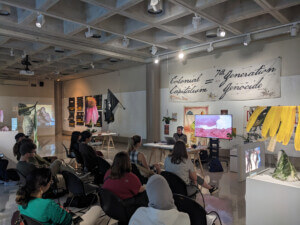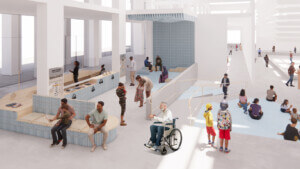The Rhode Island School of Design (RISD) is continuing its search for ten full-time faculty members with expertise in the areas of race, colonization, decolonization, post-coloniality, and cultural representation as part of a so-called “Race in Art & Design” cluster-hire initiative. The program kicked off earlier this summer in response to calls for increased diversity in courses of study—and the faculty leading said curricula—offered by the 143-year-old art school.
Launched early last month, the hiring initiative has created openings for qualified academics in three separate academic divisions at RISD: Liberal Arts and Experimental and Foundational Studies (four positions); Architecture and Design (three positions); and Fine Arts (three positions). More details about the available professorships, as listed by the RISD Center of Social Equity & Inclusion (SEI), can be found on the school’s human resources page.
Per a news release from the school, ideal candidates vying for the professorships—made possible through one of the largest (anonymous) gifts in the school’s history—should “be engaged in research-based creative practice and/or scholarship addressing the lives, experiences and cultural traditions of BIPOC communities and ready to lead cross-disciplinary dialogue in support of RISD’s SEI.” The Race in Art & Design search committee will give preference to those whose scholarship and practice focuses on African and African American diasporas and Indigenous North American and Latinx communities. However, candidates with expertise in other Indigenous or “historically marginalized communities of color” are also encouraged to apply according to the school.
The new hires will officially begin their roles starting in fall 2021.
“We repeatedly heard from our community that the most definitive transformation we could make would be to increase the diversity of the scholarship of our faculty and thereby our pedagogy,” said RISD President Rosanne Somerson in a statement, noting that the cluster hires will help to launch a “fundamental transformation toward diversifying and expanding our curricula.”
“I want to acknowledge and thank the student-led RISD Anti-Racism Coalition (risdARC) and the group of BIPOC faculty who passionately led the efforts to instigate much-needed change at RISD, along with the generous anonymous donors who made this possible,” she added. “This cluster hire initiative is a cornerstone effort of many major commitments underway to make substantive, meaningful and durable change at RISD.”
The other change-prompting commitments underway at RISD alluded to by Somerson are indeed numerous and include, but certainly aren’t limited to, a planned staff diversity and inclusion training program for December; the establishment of a Committee on Social Equity within the Board of Trustees; the redirection of public safety-earmarked funds for additional training and community engagement initiatives; an enhanced events and programs calendar that will include global and underrepresented voices alongside revised and added course offerings; the renaming of the school’s Plantation Buildings; the allocation of 75 percent of the RISD Museum’s annual acquisitions budget toward works by BIPOC artists, and the creation of race- and ethnicity-including institutional dashboards that will help the school to “analyze the diversity of our faculty, staff and students from both a domestic and a holistic perspective.” And this is just the start.
To create transparency around a July 15 open letter penned by Somerson in which she pledged to enact sweeping and impactful changes including some of those mentioned above, the school has also launched an online SEI accountability dashboard that will track progress on previously made commitments, announce new initiatives, and “acknowledge work yet to come” in building an “anti-racist, equitable, and inclusive RISD.” In October, Somerson published a follow-up to her July 15 letter listing various accomplishments and updates while reaffirming the school’s “commitment to consequential, scaled change.”
While life at RISD has mainly shifted online as far as large events and seminars go due to the coronavirus pandemic, the school’s “de-densified” campus on the western slope of Providence’s College Hill neighborhood is still bustling with activity. Some fall classes transitioned outdoors with many studios—the heart of any art school—remaining open for student use with health and safety precautions (think: social distancing and Plexiglass barriers aplenty) fully in place. In June, the school, pummeled by COVID-prompted financial woes, revealed a $50 million budget deficit while also announcing sweeping cost-cutting plans including faculty layoffs. The following month, the school and faculty reached an agreement that averted faculty layoffs during the current academic year.











